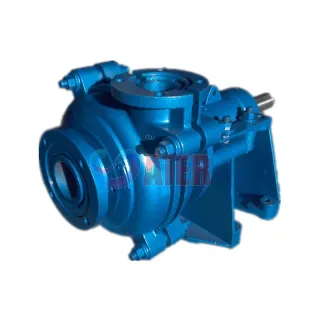نويابىر . 07, 2024 22:33 Back to list
Rubber Impeller Solutions for Efficient Slurry Pump Manufacturing and Performance
The Importance of Rubber Impellers in Slurry Pumps A Deep Dive into Manufacturing and Applications
Slurry pumps are essential components in various industries, including mining, construction, and wastewater management. Among the critical parts of these pumps, the impeller plays a pivotal role in influencing the pump's efficiency and durability. In recent years, rubber impellers have gained significant traction due to their unique properties, making them indispensable for numerous applications. This article explores the manufacturing processes, advantages, and applications of rubber impellers in slurry pumps, providing a comprehensive overview of their significance in modern industrial settings.
The Manufacturing Process of Rubber Impellers
The production of rubber impellers for slurry pumps involves a multi-step process that ensures quality, performance, and reliability. Initially, high-grade natural or synthetic rubber is selected based on its elasticity, resilience, and resistance to wear and tear. The choice of material is crucial, as it directly affects the pump's performance and longevity.
Once the rubber is sourced, it's mixed with various additives to enhance its properties. Fillers, accelerators, and curing agents are commonly used to improve strength, flexibility, and resistance to chemical degradation. The resulting compound is then subjected to a rigorous molding process, where it is shaped into the desired impeller configuration using specialized molds.
After molding, the impeller undergoes a curing process, which involves heating to initiate cross-linking of the rubber molecules. This step is essential in achieving the desired hardness and elasticity. Following curing, the impeller is inspected for quality assurance, ensuring that it meets industry standards. Each component is thoroughly tested for its performance characteristics, including wear resistance, flow dynamics, and durability.
Advantages of Rubber Impellers
Rubber impellers offer several advantages over their metal counterparts, making them a popular choice for slurry pumps. One significant benefit is their excellent resistance to abrasion. The abrasive nature of slurries, comprising solid particles suspended in liquid, poses a severe threat to pump components. Rubber impellers are designed to withstand this wear, significantly extending the service life of the pump.
rubber impeller of slurry pump factory

Additionally, rubber impellers exhibit superior resilience and flexibility. This flexibility allows for better handling of varying flow rates and pressures, which are commonplace in slurry transport. The ability to absorb shocks and vibrations enhances operational efficiency, reducing the likelihood of mechanical failures.
Rubber also offers impressive resistance to corrosion, particularly in acidic or alkaline slurries. This property is crucial in industries such as mining, where pumps are often exposed to corrosive substances. The longevity of rubber impellers translates to lower maintenance costs and reduced downtime, which are vital for maintaining productivity.
Applications of Rubber Impellers
The versatility of rubber impellers makes them suitable for a range of applications across diverse industries. In the mining sector, slurry pumps equipped with rubber impellers are used to transport mineral slurries, tailings, and concentrate, ensuring efficient and safe handling of materials.
In the construction industry, rubber impellers are commonly found in pumps that deal with concrete or cement slurries. Their ability to withstand harsh conditions and abrasive materials makes them ideal for these demanding environments.
Moreover, in wastewater management, rubber impellers are employed to pump sewage and other effluent. Their resistance to corrosion and wear ensures that these pumps function effectively over extended periods, safeguarding public health and the environment.
Conclusion
The integration of rubber impellers in slurry pumps revolutionizes the way industries handle abrasive and corrosive materials. With their superior durability, flexibility, and resistance to wear, these components play an essential role in enhancing the performance and lifespan of pumps. As manufacturing techniques continue to evolve, the significance of rubber impellers will only grow, solidifying their place as a critical element in the industrial landscape. By investing in high-quality rubber impellers, industries can boost efficiency, reduce costs, and improve overall operational performance, ensuring that they remain competitive in an ever-changing marketplace.
-
High-Quality Sand Suction Dredge Pump Factories Durable & Efficient
NewsMay.22,2025
-
High-Quality Interchangeable Slurry Pump Spare Parts Supplier China
NewsMay.22,2025
-
China Gravel Dredge Pump - Heavy-Duty Slurry & Sand Dredging
NewsMay.22,2025
-
Durable Centrifugal Wastewater Pumps China Abrasives Pump Suppliers
NewsMay.21,2025
-
High-Quality Horizontal Centrifugal Slurry Pump China Factory & Supplier
NewsMay.21,2025
-
China Slurry Pump Rubber Parts - Durable & Custom Solutions
NewsMay.20,2025
